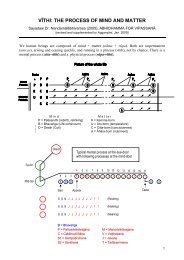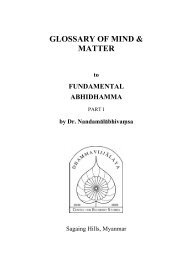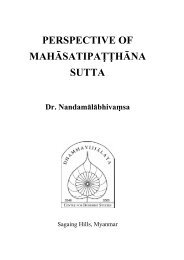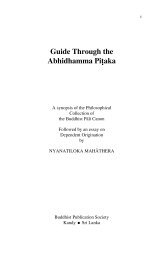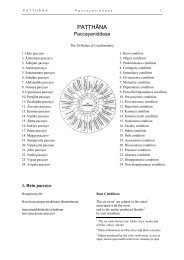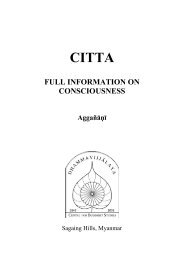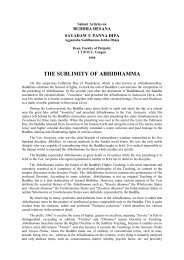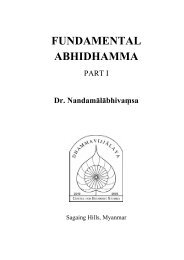ABHIDHAMMA IN DAILY LIFE - Abhidhamma.com
ABHIDHAMMA IN DAILY LIFE - Abhidhamma.com
ABHIDHAMMA IN DAILY LIFE - Abhidhamma.com
Create successful ePaper yourself
Turn your PDF publications into a flip-book with our unique Google optimized e-Paper software.
to everybody in his <strong>com</strong>munity. Those who abstain from intoxicants will be free the world from<br />
such misery and distress.<br />
After understanding the benefits of observing the Five Precepts, we can carry on to study in a<br />
similar manner the blessings of right livelihood. We have found out so far that the observance of<br />
Five Precepts will save the world from misery and anxiety. Now we will fully realize that<br />
morality is better than generosity. So, each one should be mindful to observe the Five Precepts.<br />
May all readers be able to observe the Five Precepts and propagate loving-kindness and<br />
<strong>com</strong>passion to all sentient beings.<br />
6.7 keeping Sabbath - Uposatha Síla<br />
By keeping Sabbath, the Eight Precepts, on Sabbath days you also observe non-indulgence in<br />
sex, refrain from having food after midday etc. in addition to the basic Five Precepts. The<br />
additional three prefects are meant to purify one's mind; the basic five prevent others from<br />
suffering..<br />
Those who observe eight precepts should continue to meditate on the virtues of the Buddha,<br />
Dhamma, and Sangha or on the virtues of your own Charity and Morality. Consequently they<br />
will find that there is less and less greed, anger, delusion, conceits other defilements arising from<br />
them. Their minds be<strong>com</strong>e purer and nobler day by day. Observance of the Eight Precepts<br />
supplemented with meditation (bhávaná) is much meritorious than observance of ordinary Five<br />
Precepts.<br />
6.8. Meditation – (Bhávaná)<br />
a. Loving kindness meditation - Bhávaná means development or cultivation of mind. It is a<br />
form of work of the mind, which purifies your mind. When you earnestly wish for the welfare of<br />
all beings and emanate loving-kindness on them, it is practice of mettá meditation - bhávaná.<br />
First you cultivate mettá in your mind and then try it so that your whole self be<strong>com</strong>es suffused<br />
with mettá.<br />
b. Compassion Meditation - When loving kindness flourish in your mind, you feel <strong>com</strong>passion<br />
for helpless and poor beings. Consequently you emanate <strong>com</strong>passionate thoughts to the destitute.<br />
This is called <strong>com</strong>passion meditation - karuna bhávaná.<br />
c. Sympathetic joy meditation -You now develop a strong urge to alleviate the sufferings of the<br />
poor and miserable. Since there flourish both loving-kindness and <strong>com</strong>passion in your heart you<br />
begin to feel sympathetic joy - (Mudita) towards the rich. You feel genuine, altruistic joy for<br />
them. This is meditation on sympathetic joy - Mudita bhávaná. The three types of bhávaná can<br />
be developed by everyone with a virtuous mind even in everyday life.<br />
6.9 Meditation on Recollection of Buddha's Virtues - Buddhanussati Kammatthana<br />
About Recollection of Buddha's Virtues, you need to concentrate on the three attributes: -<br />
Page 56 A Gift of Dhamma Maung Paw, California




